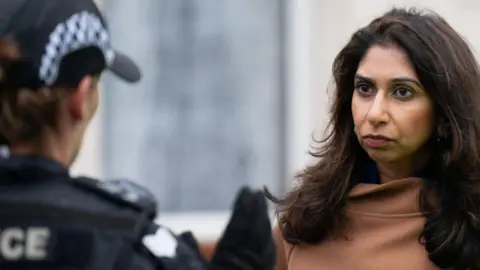Suella Braverman: Rishi Sunak still has confidence in home secretary
 PA Media
PA MediaThe prime minister has backed Suella Braverman in the face of calls to sack her over an article she wrote accusing the police of bias.
A former senior officer has accused the home secretary of trying to "end" police independence in her unauthorised article in the Times on Wednesday.
Chancellor Jeremy Hunt said Mrs Braverman's comments "are not words that I myself would have used".
But Downing Street said Rishi Sunak still had "full confidence" in her.
A decision on the home secretary's future is unlikely to be made ahead of the pro-Palestinian protest march and Armistice Day on Saturday.
In her article, Mrs Braverman, who declined to talk to reporters earlier as she left her home, claimed aggressive right-wing protesters were "rightly met with a stern response", while "pro-Palestinian mobs" were "largely ignored".
She went on to say police were applying "double standards" and "played favourites when it comes to demonstrators".
A source close to the home secretary said she had met with Met Police Commissioner Sir Mark Rowley this afternoon "to discuss the policing of demonstrations to be held tomorrow, on Armistice Day".
"The home secretary emphasised her full backing for the police in what will be a complex and challenging situation and expressed confidence that any criminality will be dealt with robustly," the source added.
'Direct the police'
On Thursday, it emerged that she had defied a Downing Street request to tone the article down.
Downing Street said it had launched an informal investigation into how Mrs Braverman's article came to be published without the changes they had requested.
But the prime minister's spokeswoman said the government's "collective focus" was on making sure the weekend's events would go ahead without disruption.
Neil Basu, the former head of the UK's counter-terrorism police, said Mrs Braverman's comments were "tantamount to effectively trying to direct the police".
Speaking on the BBC's Today Podcast, Mr Basu said the UK was "in danger of turning the police into an arm of the state directed by politicians".
He said he would describe what is happening "as potentially the end of operational independence of policing unless people start to speak out".
Gavin Stephens, the head of the National Police Chiefs' Council, told the BBC policing could be undermined if "public debate" influences decision making.
Former permanent secretary at the Home Office, Sir David Normington has Mrs Braverman comments showed she is "unsuitable" to be home secretary,
"I worked for five Home Secretaries - none of them would have done anything like this," Sir David told Radio 4's PM programme.
The Liberal Democrats, the SNP and some Conservative MPs have called for Mrs Braverman's removal from office over the article. Labour leader Sir Keir Starmer accused Mrs Braverman of undermining the police and said Rishi Sunak was "too weak to do anything about it".
Right-wing support
But Mrs Braverman's allies on the right of the Conservative Party have rallied behind her, with the deputy party chairman, Lee Anderson, tweeting to say the home secretary was "guilty of saying what most of us are thinking".
Tory MP Miriam Cates called the home secretary's view very "mainstream in the rest of the UK," and argued she "should be allowed to get on with her job in the way she chooses to do it".
The Times said changes to Mrs Braverman's article requested by 10 Downing Street included removing a warning to the police not to take a "soft touch" approach at the Armistice Day protest, along with claims there was "ample evidence" senior police officers were biased.
The paper reported further requested changes, including suggestions that she remove a comparison to marches in Northern Ireland, were rejected by Mrs Braverman.
The political row comes just days before Mrs Braverman finds out whether the government's flagship Rwanda plan for migrants can go ahead.
On Wednesday the Supreme Court will decide whether to back the Court of Appeal's ruling in June that the policy is unlawful.
The Metropolitan Police has said it expects a large rally on Saturday, sparking fears of violent clashes with counter-protesters.
Saturday is also Armistice Day, the anniversary of the end of World War One, which has prompted calls from the prime minister and others for the pro-Palestine march to be cancelled, on the grounds that it is "disrespectful".
Met Police commissioner Sir Mark Rowley said protests may only be stopped if there is a threat of serious disorder, and that the "very high threshold" has not been reached.

Analysis
By Lucy Gilder, home and social affairs researcher
Suella Braverman suggested in The Times that during the Covid-19 pandemic, "lockdown objectors" were treated more harshly by police than Black Lives Matter (BLM) protesters.
One way to compare how police respond to protests is to look at the number of arrests. Data released by the Metropolitan Police to the London Assembly shows that there were more arrests of anti-lockdown protesters than arrests of BLM protesters.
In 2020 there were:
- 374 anti-lockdown arrests, of which 351 were for breaching Covid regulations
- 281 BLM arrests, of which 19 were for breaching Covid regulations
The Met did not collect information on how many people were at each protest, but press reports indicated that many more people attended anti-lockdown marches. Also, the number of BLM arrests took place over just one month between May and June 2020 but anti-lockdown arrests took place over six months.
Both of these factors could explain why there were more arrests of anti-lockdown protestors.
